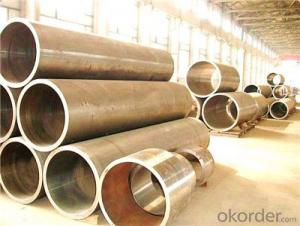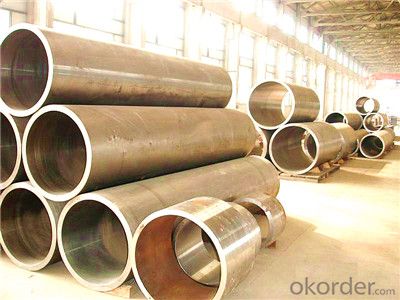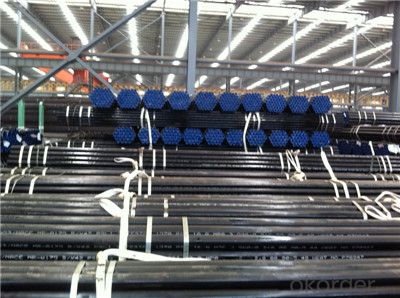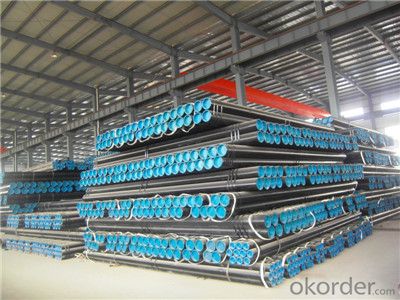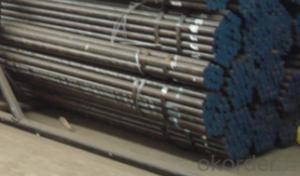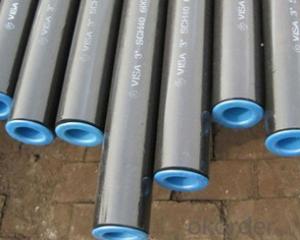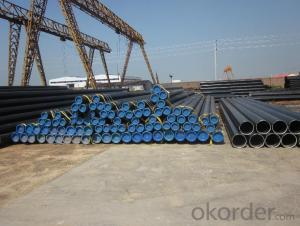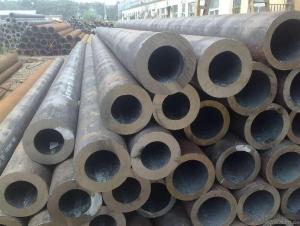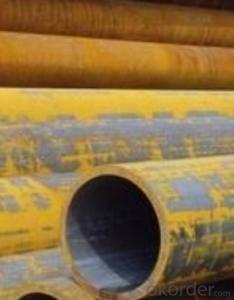hot selling Carbon Seamless Steel pipe from CNBM
- Loading Port:
- Tianjin
- Payment Terms:
- TT OR LC
- Min Order Qty:
- 50 m.t.
- Supply Capability:
- 2000000 m.t./month
OKorder Service Pledge
OKorder Financial Service
You Might Also Like
PRODUCT DETAILS
1.Structure of Seamless Steel Pipe Description:
A large amount of Seamless Steel Pipes is offered to the clients at cost effective rates. These pipes are extremely durable, resistant to corrosion and have high tensile strength. Our pipes are used in nuclear plants, power plants, refineries and construction industry across the country. Furthermore, we are capable of providing these seamless pipes to the clients in bulk quantity.
2.Main Features of the Steel Pipe:
• High manufacturing accuracy
• High strength
• Small inertia resistance
• Strong heat dissipation ability
• Good visual effect
•Reasonable price
3.Packaging & Delivery:
| Packaging Details: | Seaworthy packages, bundles wrapped with strong steel strip |
| Delivery Detail: | 15-30 days after received 30% TT |
4.Seamless Steel Pipe Specification:
| Standard: | GB, DIN, ASTM,ASME, ASTM A106-2006, ASTM A53-2007 |
| Grade: | 10#,20#, 45#, 16Mn |
Thickness: | 8 - 33 mm |
| Section Shape: | Round |
| Outer Diameter: | 133 - 219 mm |
| Place of Origin: | Shandong, China (Mainland) |
| Secondary Or Not: | Non-secondary |
| Application: | Hydraulic Pipe |
| Technique: | Cold Drawn |
| Certification: | API |
| Surface Treatment: | factory state or painted black |
| Special Pipe: | API Pipe |
| Alloy Or Not: | Non-alloy |
| Length: | 5-12M |
| Outer Diameter: | 21.3-610mm |
5.Product pictures
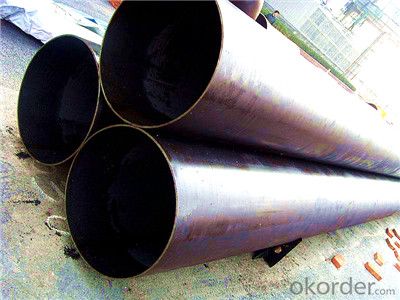
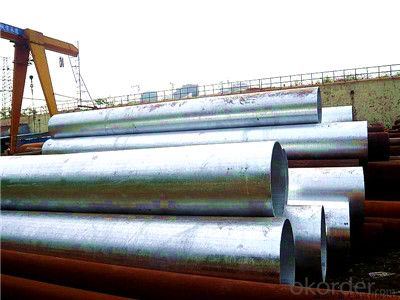
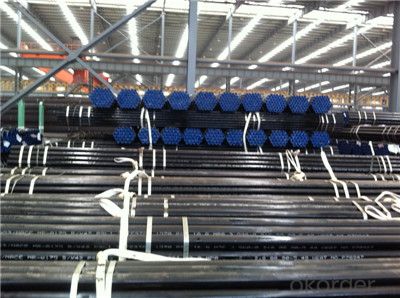
5.FAQ of Seamless steel pipe:
①How is the quality of your products?
Our products are manufactured strictly according to national and internaional standard, and we take a test
on every pipe before delivered out. If you want see our quality certifications and all kinds of testing report, please just ask us for it.
Guaranteed: If products’ quality don’t accord to discription as we give or the promise before you place order, we promise 100% refund.
②How about price?
Yes, we are factory and be able to give you lowest price below market one, and we have a policy that “ for saving time and absolutely honest business attitude, we quote as lowest as possible for any customer, and discount can be given according to quantity”,if you like bargain and factory price is not low enough as you think, just don’t waste your time.Please trust the quotation we would give you, it is professional one.
③Why should you chose us?
Chose happens because of quality, then price, We can give you both.Additionally, we can also offer professional products inquiry, products knowledge train(for agents), smooth goods delivery, exellent customer solution proposals.Our service formula: good quality+good price+good service=customer’s trust.
SGS test is available, customer inspection before shipping is welcome, third party inspection is no problem.
Any question, pls feel free to contact us !
- Q: Are steel pipes suitable for underground compressed air systems?
- Generally, steel pipes are suitable for underground compressed air systems. They are a popular choice due to several advantages they possess. First and foremost, steel pipes are renowned for their strength and durability. This enables them to withstand the pressure and stress associated with compressed air systems. They can handle high operating pressures without the risk of bursting or leaking. Secondly, steel pipes exhibit excellent resistance to corrosion. They can endure exposure to moisture, soil, and other elements found underground. This reliability makes them ideal for underground installations where pipes may encounter potentially corrosive substances. Moreover, steel pipes are relatively easy to install and maintain. They can be securely connected through welding or threading, ensuring a leak-free connection. Additionally, inspecting and repairing steel pipes is a simple process, allowing for cost-effective maintenance and repairs. Nevertheless, it is important to consider other factors that may impact the suitability of steel pipes for underground compressed air systems, such as specific requirements and conditions. Consulting a professional engineer or qualified expert is advisable to determine the most appropriate choice for a particular application.
- Q: How do you determine the required wall thickness for steel pipes?
- The required wall thickness for steel pipes is determined by considering various factors such as the internal pressure, external loads, pipe material, and the desired safety factor. This is typically calculated using engineering principles, industry standards, and specific pipe design codes to ensure the pipe can withstand the anticipated conditions without failure or deformations.
- Q: Can steel pipes be coated for additional protection?
- Yes, steel pipes can be coated with various materials to provide additional protection against corrosion, abrasion, and other environmental factors. Coatings such as epoxy, polyethylene, and zinc can be applied to enhance the durability and lifespan of steel pipes, making them suitable for diverse applications in different industries.
- Q: How are steel pipes used in the manufacturing of offshore wind turbines?
- Steel pipes are used in the manufacturing of offshore wind turbines for various purposes such as the foundation, tower, and substructure. These pipes provide structural support and stability to the turbine, ensuring its ability to withstand harsh offshore conditions and strong winds. Additionally, steel pipes are used to transport electrical cables, allowing the turbines to generate and transmit electricity efficiently.
- Q: How do steel pipes compare to other materials like PVC or copper?
- Steel pipes have several advantages over other materials like PVC or copper. Firstly, steel pipes are incredibly strong and durable. They can withstand high pressure and extreme temperatures without cracking or bending. This makes them ideal for heavy-duty applications such as industrial piping systems or underground installations. Secondly, steel pipes have excellent corrosion resistance. Unlike copper pipes that can corrode over time, steel pipes are typically coated with anti-corrosive materials such as zinc or epoxy. This protective layer prevents rust and ensures a longer lifespan for the pipes. Furthermore, steel pipes offer superior fire resistance compared to PVC or copper. They are non-combustible and can withstand high temperatures for extended periods without deforming or releasing toxic gases. This makes steel pipes a safer option for applications where fire hazards are a concern. In terms of cost, steel pipes may be more expensive than PVC initially, but they offer better long-term value due to their durability and longevity. Copper pipes, on the other hand, can be quite expensive and are susceptible to theft due to their scrap value. Lastly, steel pipes are highly versatile and can be used in various applications, including water supply, sewage systems, gas pipelines, and oil refineries. They can handle high volumes of fluid with ease and are resistant to external factors like UV rays or physical impacts. Overall, steel pipes are a reliable and efficient choice for many industries and applications, offering strength, durability, corrosion resistance, fire resistance, and versatility that sets them apart from materials like PVC or copper.
- Q: What is the maximum bending radius for steel pipes?
- The maximum bending radius for steel pipes typically depends on the specific grade and diameter of the pipe, but generally, it ranges from three to five times the pipe's outer diameter.
- Q: Can steel pipes be used for wastewater treatment?
- Yes, steel pipes can be used for wastewater treatment. Steel pipes are commonly used in various stages of wastewater treatment processes, such as conveyance, distribution, and collection systems. They are durable, corrosion-resistant, and can withstand high-pressure conditions, making them suitable for transporting wastewater efficiently and safely. Additionally, steel pipes can be coated or lined to enhance their resistance to corrosion and improve their performance in harsh wastewater environments.
- Q: How are steel pipes used in the agriculture industry?
- Steel pipes are used in the agriculture industry for various purposes such as irrigation systems, drainage systems, and livestock handling equipment. They provide a durable and reliable solution for transporting water, nutrients, and effluents, ensuring efficient and effective operations in farm settings.
- Q: What are the different methods of heat treatment for steel pipes?
- There are several methods of heat treatment for steel pipes, including annealing, normalizing, quenching, tempering, and stress relieving.
- Q: How are steel pipes protected against electromagnetic interference?
- Steel pipes can be protected against electromagnetic interference by using a variety of methods such as shielding, grounding, and insulation. Shielding involves wrapping the pipes with a conductive material, like copper or aluminum, which acts as a barrier to block electromagnetic waves. Grounding ensures that any stray electrical charges are safely directed away from the pipes, reducing the risk of interference. Insulation, such as coatings or sleeves, can also be applied to prevent direct contact between the pipes and potential sources of electromagnetic interference.
Send your message to us
hot selling Carbon Seamless Steel pipe from CNBM
- Loading Port:
- Tianjin
- Payment Terms:
- TT OR LC
- Min Order Qty:
- 50 m.t.
- Supply Capability:
- 2000000 m.t./month
OKorder Service Pledge
OKorder Financial Service
Similar products
Hot products
Hot Searches
Related keywords
